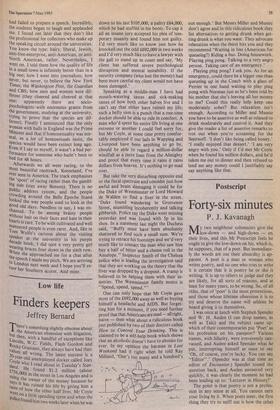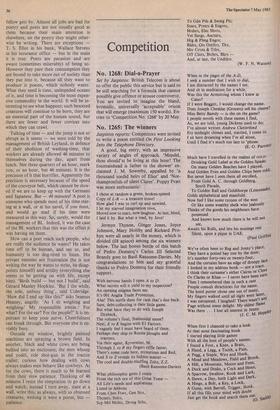Postscript
Forty-six minutes
P. J. Kavanagh
My two neighbour columnists give the low-down — and high-down — on their lives, and this Mr Postscript feels he ought to give the low-down on his, which is, he supposes, that of a poet. But immediate- ly the words are out their absurdity is ap- parent. A poet is a man or woman who writes poetry, and no one who tries to write it is certain that it is poetry he or she is writing. It is up to others to judge and they are likely, for all sorts of reasons, and at least for many years, to be wrong. So, of all titles, that of 'poet' is the most pretentious, and those whose lifetime obsession it is to try and deserve the name will seldom be heard giving it to themselves.
I was once at lunch with Stephen Spender and W. H. Auden (I can drop names, as well as Taki) and the subject came up: which of their contemporaries put 'Poet' as his profession on his passport? Various names, with hilarity, were irreverently can- vassed, and Auden asked Spender what he put, interrupting himself at once to say 'Oh, of course, you're lucky. You can say "Editor".' (Spender was at that time an editor of Encounter.) Spender tossed the question back, and Auden answered very quickly, it was clearly the moment he had been leading up to: 'Lecturer in History!'
The point is that poetry is not a profes- sion in any sense at all. You cannot earn your living by it. When poets meet, the first thing they try to sniff out is how the other fellow gets by. Almost all jobs are bad for poetry and poets are not usually good at them because their main attention is elsewhere, on the poetry they might other- wise be writing. There are exceptions T. S. Eliot in his bank, Wallace Stevens in his insurance office — but in the main it is true. Poets are parasites and are aware (sometimes miserably) of being so. However they pare their consumption they are bound to take more out of society than they put into it, because all they want to produce is poems, which nobody wants. What they need is time, unimpeded oceans of it, and time is becoming the most expen- sive commodity in the world. It will be in- teresting to see what happens; such besotted creatures will continue to be born, they are an essential part of the human sound, but there are fewer and fewer crevices into which they can crawl.
Talking of time — and the jump is not so abrupt as it seems — we were told by the management of British Leyland, in defence of their abolition of washing-time, that workers are already allowed 46 minutes to themselves during the day, apart from lunch. Not three quarters of an hour, mark you, or an hour, but 46 minutes. It is the precision of it that horrifies. Apparently the precision is necessary because of the speed of the conveyor belt, which cannot be slow- ed if we are to keep up with the Germans and Japanese. But — 46 minutes! A poet is someone who spends most of his time star- ing at a wall, or at his navel, if you must, and would go mad if his time were measured in this way. So, surely, would the management of BL. Indeed, it was the case of the BL workers that this was the effect it was having on them.
How can a poet reach such people, who are really the audience he wants? He takes time off to be human, and say so, and humanity is too dog-tired to listen. His private enemies are frustration (he is not writing the way he wants to write, he disap- points himself) and aridity (everything else seems to be getting on with life, except him). 'Birds build — but not I build', said Gerard Manley Hopkins. 'But I the while, the sole, unbusy thing', said Coleridge. 'How did I end up like this?' asks Seamus Heaney, angrily: 'As I sit weighing and weighing/ My responsible tristia./ For what? For the ear? For the people?' It is im- portant to keep your nerve. Cheerfulness can break through. But everyone else is en- viably busy.
Outside my window, brightly painted machines are spraying a brown field. In another, black and white cows are being bullied into an enclosure; the men whoop and yodel, ride shot-gun in the tractor trailer; curious how dealing with cows always makes men behave like cowboys. As for the cows, there is much to be learned from their slow patience. Thinking of 46 minutes I resist the temptation to go down and watch; instead I turn away, stare at a wall, write this; as always, with us obsessed creatures, wishing it were a poem, but patience.











































 Previous page
Previous page